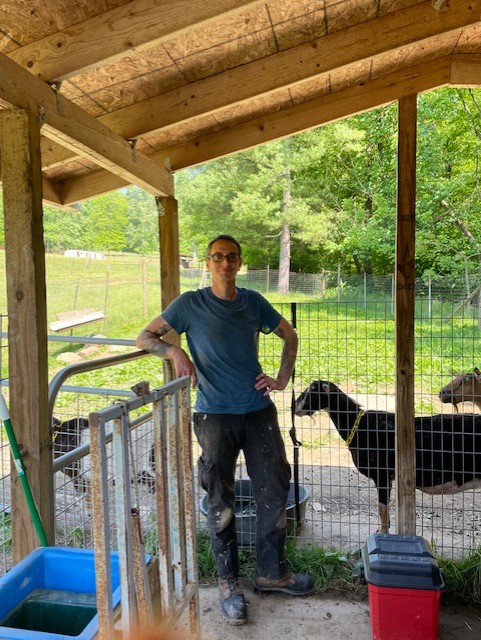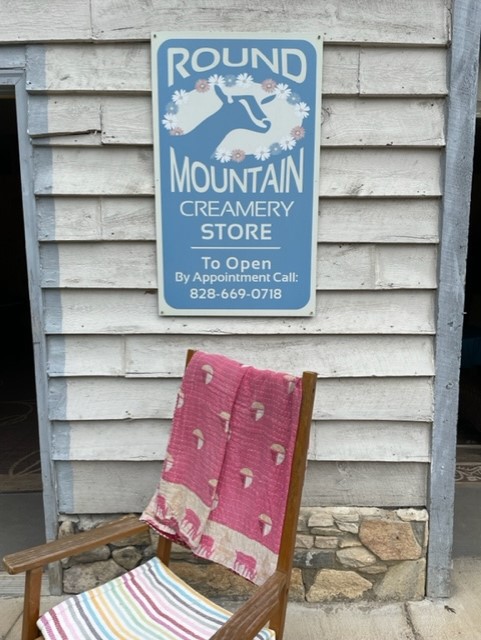Round Mountain Creamery
Round Mountain Creamery, A Culture of Passionate Goat Farmers
Sandra Yerges
History
Raising goats is a passion for Adam Jernigan, manager at Round Mountain Creamery in Black Mountain, North Carolina. On a farm with 63 goats spanning a small acreage of land, Adam works with the production of goat milk ultimately processed into cheese and sold to local restaurants and grocers. Although many may see this as a laborious undertaking, he notes this is more than just a career. “This isn’t a job - it’s my way of life,” Adam explained.
In 2002, Round Mountain Creamery established itself as a new dairy goat farm in the area. Linda Seligman, owner of the farm, started with only five goats and a dream to grow a successful creamery. Adam joined the business eight years ago as a part-time evening milker for a few days a week. As a graduate student working toward his MFA in Creative Writing, Adam was able to view what it takes to keep up with the demands of a creamery. Now most of the daily farm operations, such as herd upkeep and milking, that once were completed by Linda, have been delegated to Adam.
The cheese they produce is known as chevre, a French term for goat cheese. In order for the chevre to reach the restaurants to which they are sold, the process begins with the milking of the goats. There are 33 goats on the farm who are actively producing milk. Instead of milking the goats by hand, their milk is collected with state-of-the-art machinery often utilized in large creameries. From there, the milk is pasteurized and mixed with cultures and rennet to convert the milk into cheese.
VAPG Funding
The $45,000 awarded to Round Mountain Creamery from the Value Added Producer Grant in 2021 proved to be very helpful in this step of chevre production. With these funds, Adam and his team were able to purchase more supplies to make the cheese, such as cultures and five pound packaging to store the cheese. “The grant allowed us to buy everything we needed for the milking season before it started,” said Adam.
Because there are times throughout the year where milk is not always being produced, including when the goats are pregnant or nursing their kids, having enough packaging is important. Adam explained that some of the cheese is frozen during production surpluses to ensure there is enough cheese to supply the public when production is halted. The five pound bags they secured with the grant allows them to keep the cheese fresh and in abundance.
In order to keep the consumer safe while consuming animal products, there is a strict food safety protocol that must be adhered to from the FDA. Round Mountain Creamery prioritizes this standard in every element of their farm, including the health of the goats and the cleanliness of the production facility.
Being that goats are outdoor animals, there is always a risk of them receiving unwanted pathogens from the environment. In a proactive manner, Adam works diligently to maintain the herd’s health and
medicate the animals in need at the first sign of illness. The farm also has high cleanliness standards regarding the rooms that house their machinery. Any individual entering these rooms must clean off their shoes and wear coats so the cheese is produced in the safest conditions. The attention that this business places on keeping every step of the production process pristine allows the restaurants they sell to rely on them for quality products.
Outside of the state in Atlanta, Georgia, there is a restaurant named Farm Burger whose Asheville branches are frequent customers of Round Mountain Creamery. Many companies in the area rely on Sysco, a large food distribution company, to supply their restaurants. Now that this creamery is available to sell its small-scale products to larger businesses, they help support the local industries in the region.
Although much of the revenue generated by this company is from restaurants, Round Mountain Creamery also sells their cheese to the public at the store on their farm. Often showcased on their Instagram page, visitors can test out these cheeses on their tours at the facility. There are many cheeses to choose from, including soft cheeses mixed with garlic, jalapenos, and even blueberries.
Within the past few years, the amount of cheese produced by the farm has grown exponentially. According to Adam, over 4,000 pounds of cheese was produced last year and he anticipates exceeding 5,000 pounds in 2022. With the equipment they currently have on their farm, this number is sustainable for the size of the company.
If Round Mountain Creamery were looking to grow to a production quantity of over 6,000 pounds of chevre, the company would need to invest in larger pasteurization equipment. Adam explains the current equipment and farm size is perfect for the operations they have today. There is room for approximately ten more goats, but the current production volume allows the company to focus on providing their customers with a positive cheese experience.
During the process, Adam was surprised at the simplicity of participating in the Value Added Producer Grant. He mentioned it was as seamless as mailing in a receipt to the USDA and the money was quickly reimbursed back to the farm. “In every reimbursement is the gift of more possibilities for the farm,” he stated.


